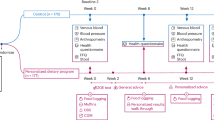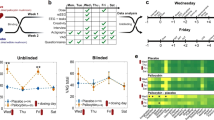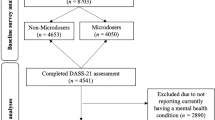Abstract
OBJECTIVE: To measure the effects of cognitive–behavioural therapy on health-related quality of life (HRQL) in obese patients, in relation to binge eating disorder.
DESIGN: Longitudinal, clinical intervention study consisting of structured sessions of cognitive–behavioural therapy, preceded by sessions chaired by a psychologist in subjects with binge eating.
SUBJECTS: Two groups of obese patients (92 treated by cognitive–behavioural therapy (77 females); 76 untreated controls (67 female), selected from the waiting list (control group)). Of 92 treated patients, 46 had a binge eating disorder at psychometric testing and structured clinical interview.
MEASUREMENTS: Health-related quality of life by means of Short-Form 36 questionnaire at baseline and after 3–5 months.
RESULTS: Cognitive–behavioural treatment produced an average weight loss of 9.4±7.5 kg, corresponding to a BMI reduction of 3.48±2.70 kg/m2. No changes were observed in the control group. All scales of HRQL improved in treated subjects (by 5–19%). In obese subjects with binge eating weight loss was lower in comparison to non-bingers (7.7±8.1 vs 11.1±6.6; P=0.034). However, the improvement in HRQL was on average larger, and significantly so for Role Limitation—Physical (P=0.006), Role Limitation—Emotional (P=0.002), Vitality (P=0.003), Mental Health (P=0.032) and Social Functioning (P=0.034). Bodily Pain was the sole scale whose changes paralleled changes in body weight.
CONCLUSIONS: The positive effects of cognitive–behavioural therapy, mainly in subjects with binge eating, largely outweigh the effects on body weight, resulting in a significant change in self-perceived health status.
This is a preview of subscription content, access via your institution
Access options
Subscribe to this journal
Receive 12 print issues and online access
$259.00 per year
only $21.58 per issue
Buy this article
- Purchase on Springer Link
- Instant access to full article PDF
Prices may be subject to local taxes which are calculated during checkout



Similar content being viewed by others

References
Apolone G, De Carli G, Brunetti M, Garattini S . Health-related quality of life (HR-QOL) and regulatory issues. An assessment of the European Agency for the Evaluation of Medicinal Products (EMEA) recommendations on the use of HR-QOL measures in drug approval Pharmacoeconomics 2001 19: 187–195.
Doll HA, Petersen SE, Stewart-Brown SL . Obesity and physical and emotional well-being: associations between body mass index, chronic illness, and the physical and mental components of the SF-36 questionnaire Obes Res 2000 8: 160–170.
Rissanen AM . The economic and psychosocial consequences of obesity Ciba Found Symp 1996 201: 194–201.
Seidell JC . The impact of obesity on health status: some implications for health care costs Int J Obes Relat Metab Disord 1995 19 (Suppl 6): S13–16.
Sullivan M, Karlsson J, Sjöström L, Backman L, Bengtsson C, Bouchard C, Dahlgren S, Jonsson E, Larsson B, Lindstedt S, Naslund I, Olbe L, Wedel H . Swedish obese subjects (SOS)—an intervention study of obesity. Baseline evaluation and psychosocial functioning in the first 1743 subjects examined Int J Obes Relat Metab Disord 1993 17: 503–512.
Fontaine KR, Cheskin LJ, Barofsky I . Health-related quality of life in obese persons seeking treatment J Fam Pract 1996 43: 265–270.
Fontaine KR, Bartlett SJ, Barofsky I . Health-related quality of life among obese persons seeking and not currently seeking treatment Int J Eat Disord 2000 27: 101–105.
McHorney CA, Ware JE Jr, Raczek AE . The MOS 36-Item Short-Form Health Survey (SF-36): II. Psychometric and clinical tests of validity in measuring physical and mental health constructs Med Care 1993 31: 247–263.
Katz DA, McHorney CA, Atkinson RL . Impact of obesity on health-related quality of life in patients with chronic illness J Gen Intern Med 2000 15: 789–796.
Han TS, Tijhuis MA, Lean ME, Seidell JC . Quality of life in relation to overweight and body fat distribution Am J Public Health 1998 88: 1814–1820.
Lean ME, Han TS, Seidell JC . Impairment of health and quality of life using new US federal guidelines for the identification of obesity Arch Intern Med 1999 159: 837–843.
Le Pen C, Levy E, Loos F, Banzet MN, Basdevant A . ‘Specific’ scale compared with ‘generic’ scale: a double measurement of the quality of life in a French community sample of obese subjects J Epidemiol Community Health 1998 52: 445–450.
Marchesini G, Solaroli E, Baraldi L, Natale S, Migliorini S, Visani F, Forlani G, Melchionda N . Health-related quality of life in obesity: the role of eating behaviour Diabetes Nutr Metab 2000 13: 156–164.
Karlsson J, Sjostrom L, Sullivan M . Swedish obese subjects (SOS)—an intervention study of obesity. Two-year follow-up of health-related quality of life (HRQL) and eating behavior after gastric surgery for severe obesity Int J Obes Relat Metab Disord 1998 22: 113–126.
Fontaine KR, Barofsky I, Andersen RE, Bartlett SJ, Wiersema L, Cheskin LJ, Franckowiak SC . Impact of weight loss on health-related quality of life Qual Life Res 1999 8: 275–277.
Foreyt JP, Poston WS . 2nd What is the role of cognitive-behavior therapy in patient management? Obes Res 1998 6 (Suppl 1): 18S–22S.
Bennett GA . Cognitive-behavioural treatments for obesity J Psychosom Res 1988 32: 661–665.
Fitzgibbon ML, Kirschenbaum DS . Distressed binge eaters as a distinct subgroup among obese individuals Addict Behav 1991 16: 441–451.
Ricca V, Mannucci E, Zucchi T, Rotella CM, Faravelli C . Cognitive-behavioural therapy for bulimia nervosa and binge eating disorder. A review Psychother Psychosom 2000 69: 287–295.
Gormally J, Block S, Daston S, Rardin D . The assessment of binge eating severity among obese persons Addict Behav 1982 7: 47–55.
Derogatis LR, Rickels K, Rock AF . The S.C.L. 90 and the M.M.P.I.: a step in the validation of a new self-report scale Br J Psychiatry 1976 128: 280–289.
Fairburn CG, Cooper Z . The eating disorder examination In: Fairburn CG, Wilson GT (eds) Binge eating 12th edn The Guilford Press: New York 1993 pp 317–360.
Derogatis LR, Cleary PA . Confirmation of the dimensional structure of the SCL-90: a study in construct validity J Clin Psychol 1977 33: 981–989.
Apolone G, Mosconi P . The Italian SF-36 Health Survey: translation, validation and norming J Clin Epidemiol 1998 51: 1025–1036.
Brownell KD . The LEARN program for weight control American Health: Dallas, TX 1991.
Fairburn CG, Marcus MD, Wilson GT . Cognitive-behavioral therapy for binge eating and bulimia nervosa A comprehensive treatment manual In: Fairburn CG, Wilson GT (eds) Binge eating: nature, assessment and treatment Guildford Press: New York 1993 pp 361–404.
Cronbach L . Coefficient alpha and the internal structure of tests Psychometrika 1951 22: 293–296.
McDowell I, Nevell C . Measuring health: a guide to rating scales and questionnaires Oxford University Press: New York 1987.
Leon GR, Roth L . Obesity: psychological causes, correlations, and speculations Psychol Bull 1977 84: 117–139.
Sarlio-Lahteenkorva S, Stunkard A, Rissanen A . Psychosocial factors and quality of life in obesity Int J Obes Relat Metab Disord 1995 19 (Suppl 6): S1–5.
Barofsky I, Fontaine KR, Cheskin LJ . Pain in the obese: impact on health-related quality-of-life Ann Behav Med 1998 19: 408–410.
Ware JE Jr, Sherbourne CD . The MOS 36-item short-form health survey (SF-36). I. Conceptual framework and item selection Med Care 1992 30: 473–483.
Sherwood NE, Jeffery RW, Wing RR . Binge status as a predictor of weight loss treatment outcome Int J Obes Relat Metab Disord 1999 23: 485–493.
Prochaska JO, Norcross JC, Fowler JL, Follick MJ, Abrams DB . Attendance and outcome in a work site weight control program: processes and stages of change as process and predictor variables Addict Behav 1992 17: 35–45.
Prochaska JO, Velicer WF . The transtheoretical model of health behavior change Am J Health Promot 1997 12: 38–48.
Prochaska JO . Strong and weak principles for progressing from precontemplation to action on the basis of twelve problem behaviors Health Psychol 1994 13: 47–51.
Mussell MP, Mitchell JE, de Zwaan M, Crosby RD, Seim HC, Crow SJ . Clinical characteristics associated with binge eating in obese females: a descriptive study Int J Obes Relat Metab Disord 1996 20: 324–331.
Mitchell JE, Mussell MP . Comorbidity and binge eating disorder Addict Behav 1995 20: 725–732.
Smith DE, Marcus MD, Kaye W . Cognitive-behavioral treatment of obese binge eaters Int J Eating Disord 1992 12: 257–262.
Acknowledgements
The authors are indebted to psychologists Francesca Visani and Simonetta Migliorini for their helpful assistance. The study was supported by a grant from University of Bologna, Fondi ex 60%, 2000.
Author information
Authors and Affiliations
Corresponding author
Rights and permissions
About this article
Cite this article
Marchesini, G., Natale, S., Chierici, S. et al. Effects of cognitive–behavioural therapy on health-related quality of life in obese subjects with and without binge eating disorder. Int J Obes 26, 1261–1267 (2002). https://doi.org/10.1038/sj.ijo.0802073
Received:
Revised:
Accepted:
Published:
Issue Date:
DOI: https://doi.org/10.1038/sj.ijo.0802073


